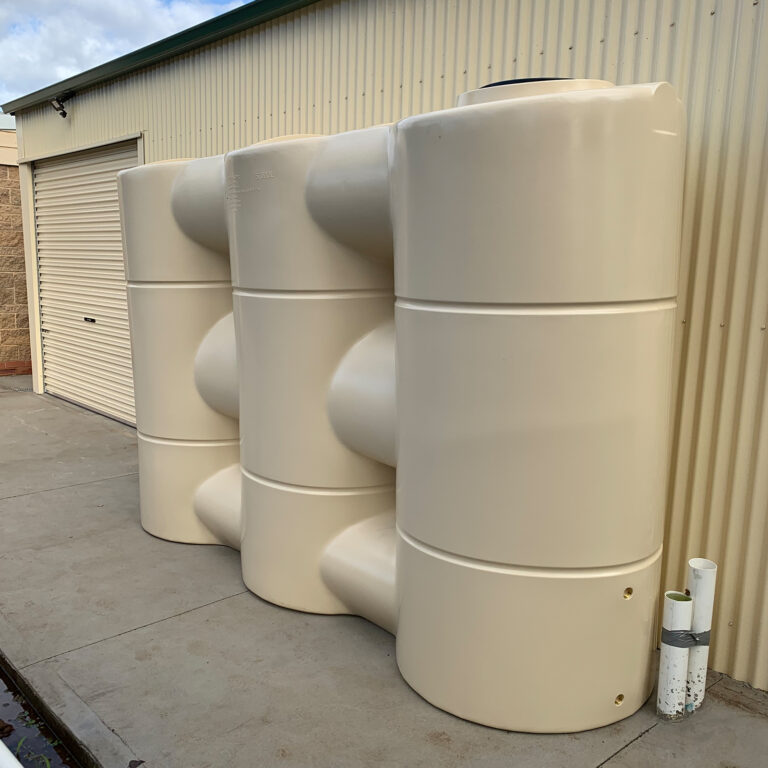Checking Out the Numerous Uses of Rain Tanks for Residential and Commercial Residences
As the worldwide focus on sustainable living techniques proceeds to heighten, the use of rainwater tanks in both household and industrial setups has emerged as a significant remedy. The complex uses of rainwater tanks offer an engaging situation for their adoption, not just as a functional water-saving step but additionally as a testimony to accountable resource monitoring.
Advantages of Making Use Of Rain Storage Tanks
Utilizing rain storage tanks offers countless advantages for both households and communities in regards to water preservation and sustainability. One of the vital benefits of making use of rainwater tanks is the substantial decrease in reliance on keys water system - Slimline water tanks. By capturing and saving rainwater for later usage, individuals and areas can lower their demand for cured water, ultimately alleviating the concern on water therapy facilities and reducing energy usage associated with water transportation and therapy
Furthermore, rainwater collecting through containers provides a dependable different water source during times of water limitations or scarcities. This stored rainwater can be used for different non-potable objectives such as irrigation, flushing bathrooms, and cleaning clothing, lowering the pressure on conventional water resources. Additionally, using rain containers can lead to set you back financial savings for both houses and communities by lowering water bills and decreasing the requirement for pricey framework growths to meet growing water demands.
Essentially, the usage of rainwater containers supplies a lasting and environmentally friendly method to water monitoring, benefiting both private users and the wider neighborhood in terms of water preservation, cost-efficiency, and strength.
Rainwater Tank Use in Watering
Provided the advantages of rain tanks in preserving water resources and reducing reliance on keys supply of water, a substantial application lies in using stored rain for irrigation objectives - Slimline water tanks. Rain harvesting systems can successfully accumulate and save rain, providing a lasting water resource for watering yards, lawns, and agricultural areas. By utilizing rainwater for watering, building proprietors can minimize their reliance on treated water sources, bring about set you back savings and environmental benefits

Among the main advantages of utilizing rainwater for watering is its pureness. Rain is normally soft and devoid of the chemicals and ingredients often discovered in mains water, making it excellent for beneficial plants without the danger of dangerous effects. Furthermore, rainwater is at ambient temperature level, which can benefit plant development by staying clear of temperature shocks that can accompany cold keys water.
Rain Containers for Commode Flushing

Executing rainwater containers for toilet flushing is a cost-efficient and eco-friendly method that can be quickly integrated into both property and industrial properties. The stored rainwater can be used to flush toilets by linking the container to the existing pipes system. This simple yet effective remedy can substantially lower water consumption in a building, particularly in areas where water shortage is a problem.

Integrating Rainwater Tanks in Landscaping
An effective strategy for improving sustainability in landscaping includes integrating rain containers to enhance water usage and promote environmentally friendly techniques - Slimline water tanks. Including rainwater containers in landscaping uses various advantages for both property and commercial residential or commercial properties. These tanks can capture and keep rainwater drainage from roofings, which can after that be used for sprinkling gardens, grass, and plants. By using rainwater for watering functions, homeowner can lower their reliance on municipal water resources, leading to cost financial savings and conservation of precious water resources.
Along with offering a lasting water source for landscaping requirements, rain storage tanks can also help in taking care of stormwater overflow. By catching rain that would otherwise stream right into storm drains, these storage tanks can minimize disintegration, decrease flooding risks, and stop contamination of all-natural water bodies. Integrating rain containers in landscape design can contribute to the overall aesthetic link allure of the building, showcasing a dedication to environmental stewardship.
Commercial Applications of Rainwater Tanks
Making use of rain storage tanks in industrial setups uses a sustainable service for water management and preservation, profiting services and the atmosphere alike. One crucial business usage is for irrigation objectives, where gathered rainwater can be made use of to water landscape design, gardens, and farming areas surrounding commercial residential or commercial properties.
Furthermore, rainwater containers can be integrated right into the fire suppression systems of commercial structures. By having a devoted water resource for firefighting functions, businesses can improve their fire precaution and potentially lower insurance coverage premiums. In addition, rainwater gathered in tanks can be dealt with and used for non-potable functions within business residential properties, such as flushing toilets, cleansing, and cooling down systems. This not only preserves freshwater resources yet also decreases operating costs for services. Overall, the consolidation of rain tanks in industrial setups presents a functional and eco responsible strategy to water administration.
Verdict
Finally, rain containers offer numerous benefits for both domestic and industrial residential properties. From irrigation to toilet flushing and landscaping, using rainwater tanks can help conserve water resources and reduce water costs. Additionally, incorporating rainwater storage tanks in industrial setups can bring about significant expense savings and environmental benefits. Generally, the convenience and sustainability of rain containers make them a beneficial investment for any homeowner wanting to increase water efficiency.